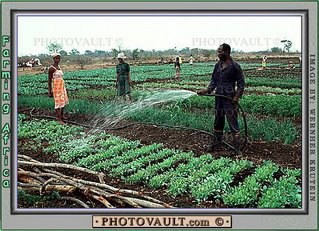By Alister Doyle, Environment Correspondent
OSLO (Reuters) - Desertification could create millions of refugees unless governments promote less water-intensive farming and new jobs ranging from solar energy to eco-tourism, U.N. experts said on Thursday.
They said many of the world's drylands, home to 2 billion people and including many crop regions from Africa to Australia, were under threat of turning to dust, in part because of a global warming widely blamed on human use of fossil fuels.
"Bad policies are as much to blame for aggravating desertification as climate change," said Zafar Adeel, head of the U.N. University's Canada-based International Network on Water, Environment and Health.
About 200 experts from 25 nations will meet in Algiers on Dec. 17-19 to try to advise on new policies to slow the spread of deserts, which now cover about a quarter of the world's land surface from the Sahara to the Gobi.
Conference organiser Adeel told Reuters 10-20 percent of drylands are already degraded, affecting almost 200 million people. Some estimates say 135 million people are at risk of being driven from their homes by desertification.
"If millions of people with skills as farmers suddenly find themselves living in desertified areas ... they have no time to adapt and have to flee," Janos Bogardi, head of the U.N. University's Institute for Environment and Human Security in Bonn, told Reuters.
New policies could include helping people whose lands are at risk from erosion to plant more drought-resistant crops or turn to new activities such as eco-tourism, fish farming or production of solar energy.
CROPS, FERTILISERS
One idea was to encourage poor people in rural areas to stop traditional burning of crop residues and animal dung for fuel, shifting to wind or solar energy. Crop residues and dung could then be used as fertiliser, slowing desertification.
"We need to have innovative solutions," Adeel said, adding that governments would have to come up with more money.
Bogardi estimated the number of people driven from their homes mainly by environmental causes already exceeded the world's 20 million political refugees. It was hard to judge because there is no category of "environmental refugee".
Governments could consider investing in solar panels to let farmers sell power as an alternative livelihood in sunny, arid regions. Even parts of southern Spain were more suitable for producing solar power than for growing water-intensive crops.
Too often farmers tried to offset degradation of drylands by ever more costly irrigation rather than switching to less water-demanding activities.
"Crops transpire water. It's a very water-intensive process," Adeel said. He added that fish farming -- such as in Egypt, Pakistan or Israel -- was a way of producing food without such heavy water use.
And tourism could also earn money for people on the fringes of deserts, as long as it did not waste valuable water. "Tourists should not expect golf courses or green lawns but be happy seeing cactus gardens," Bogardi said.© Reuters 2006. All Rights Reserved.
~~~~~~~
There needs to be a WORLDWIDE drought summit next year apart from the one mentioned in this article, in which bold and firm resolutions are set forth to help countries deal with a global drought that is now not just to be considered indigenous or sporadic.
Drought is now more pervasive, more sustained, more destructive, more costly, and more deadly than ever before. Along with the destruction of our oceans, drought is the most crucial environmental crisis we now face because it leads to lack of water and food shortages that millions of people depend on for life.
And climate change is oneof the chief causes for this desertification, along with wasteful corrupt practices regarding water management that must be changed with governments that do not take it upon themselves to push for conservation and more innovative farming management and methods being penalized for it.
And linked to that are the concerns raised in the article above surrounding bad policies regarding farming and the waste that comes from it. And as I have stated before, SOLAR energy is what will save Africa, and they need it NOW.
Other forms of irrigation include:
Drip irrigation
Irrigation in Africa:
Look at this picture from the link above. What is wrong with it?

This entry is a work in progress and more information will be added to it on an ongoing basis for the next week.
For reference:
World Water Council/Drought Preparedness


No comments:
Post a Comment